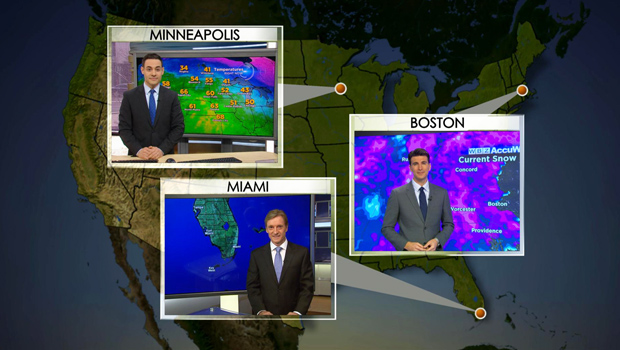What's up with the weather this year?
The first day of spring brought a snowstorm to much of the Northeast -- and it's got people asking the question, WHITHER THE WEATHER? Mo Rocca has been talking to the experts:
When Dr. Louis Uccellini talks about the weather, people listen. As director of the National Weather Service, you could say he forecasts for all of America's forecasters.
And America provides plenty of material.
"This country experiences the most severe weather and the [greatest] range of severe weather in the world," he told Rocca. "We experience tornadoes, hurricanes, snowstorms, blizzards. We have fire weather conditions affecting a large population base."
This past February weather was the top story on all three nightly network newscasts. No surprise, since this winter was the worst ever ... right?
"Oh, by far, I mean, not even close," said meteorologist Eric Fisher, who hails from CBS Station WBZ in Boston. "There's no one alive who has seen so much snow in such a short amount of time.
"The interesting thing is, in December we were thinking there wasn't even going to be a winter. We were running in shorts and T-shirts around Christmastime. And then things changed very dramatically for us."
Craig Setzer forecasts for WFOR in Miami. What does HE have to complain about?
"Nothing. Nothing at all!" Setzer said. "We had two days in February where we had winter and temperatures struggled to get into the 60s. Outside of that, it's been 70s and 80s for highs."
And for Matt Brickman, meteorologist for WCCO in Minneapolis -- which is supposed to be cold -- this has been a pretty weak winter, by Minnesota standards. "January was fine. We had about a month of cold. We've been spoiled."
Yes, Boston may have had record snowfall and near-record cold this winter, but collectively the lower 48 states are on track to have the 19th warmest winter on record.
Rocca said, "If you live in the Northeast, you would think the winter everywhere was terrible."
Well, said Brickman, "There's a lot of TV stations out in New York. So if it's snowing there, it must be snowing in the rest of the country!"
But just like in politics, all weather is local.
"If you look at the country as a whole," said Fisher, "a lot of people didn't have much to complain about. The difference is when you have big snowstorms and you've got all these pictures of misery, and you see the cold and all the big numbers that just make people cringe -- that makes good television."
That's right -- there's no good television quite like bad weather. You just can't turn away.
"Weather is the number one reason people turn to local news in the first place," said Gail Bending, the news director for WJZ in Baltimore. "And when there's bad weather, face it, they're home. They're trapped. They really watch."
And that's good news for Bending: "I think weather makes good TV because it's something people care about. And it's also great pictures.
"Weather is universal; it doesn't matter where you are in the world, people tend to gravitate to weather stories, particularly when it's in their own backyard."
While it may be big business for TV, it's also serious business. In 2013 there were almost 450 deaths and about $13 billion in damages due to bad weather.
The National Weather Service's Louis Uccellini says it's not clear if the weather itself is getting more severe, but what is clear: "We're becoming more vulnerable to these weather events.
"We have more people living along the coast, more people living in tornado-prone areas, more people living in fire-prone areas, which provides many more challenges for those who have to deal with evacuations, infrastructure decisions, because of the number of people that they have to actually work to protect."
Which means the forecast for forecasters is continued high pressure.
"When it comes to pressure, there's nothing bigger than looking at the snow totals," said Fisher. "People get so fixated on that exact number. If you forecast six to eight and there's nine, they think it was a terrible forecast, even if the impact was the same."
Brickman added, "People do think there is a giant button in the weather center that we press to make it cold. So you have to apologize: 'It's not our fault, but yeah, it's gonna be crummy today.'"
This year there's at least one prognosticator who has nothing to apologize for. Alas, Punxsutawney Phil got it right.
For more info:
